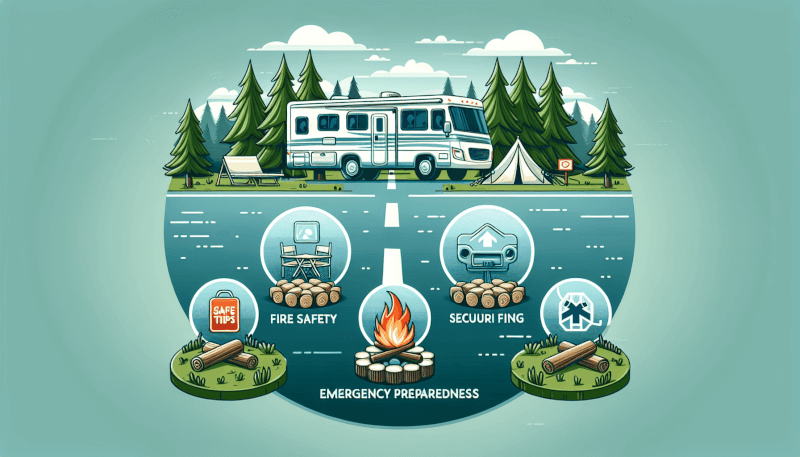Whether you’re an experienced RVer or a newbie hitting the road for the first time, ensuring your safety is essential. From knowing how to properly tow your RV to important safety measures to take during your camping adventures, this article provides a comprehensive guide of RV camping safety tips to help you confidently navigate your journey. So, before you embark on your next adventure, take a few minutes to brush up on these essential safety tips that will ensure smooth and worry-free travels.
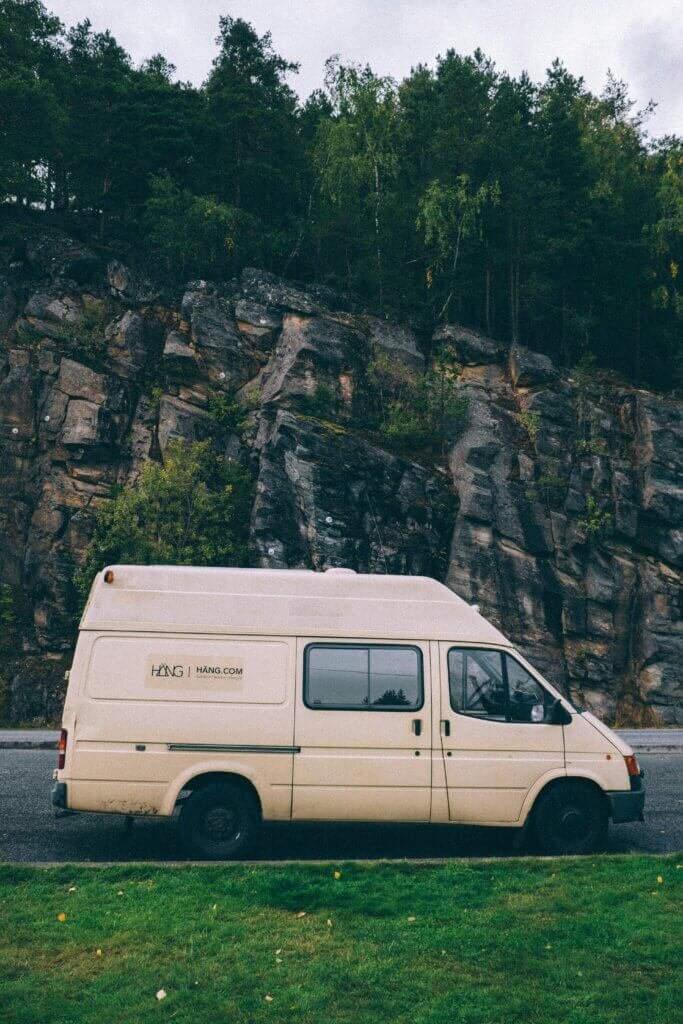
Planning and Preparation
Check the weather forecast
Before embarking on your RV camping adventure, it’s important to check the weather forecast for your destination. Weather conditions can greatly impact your trip and safety. For example, heavy rain or snow can make driving more challenging, while extreme heat or cold can affect the comfort level inside your RV. By being aware of the weather forecast, you can plan ahead and make any necessary adjustments to ensure a safe and enjoyable trip.
Plan your route
Knowing your route is crucial to a successful and safe RV camping trip. Take the time to plan your route in advance, considering factors such as road conditions, construction zones, and potential traffic congestion. It’s also a good idea to have alternative routes in mind in case of unexpected road closures or detours. By planning your route ahead of time, you can avoid unnecessary stress and potential road hazards.
Make a checklist
Creating a checklist is a simple yet effective way to stay organized and ensure you have everything you need for your RV camping trip. Include items such as camping gear, cooking utensils, bedding, toiletries, and any other essentials specific to your trip. By checking items off your list as you pack, you can minimize the risk of forgetting something important and ensure a smooth and hassle-free camping experience.
Research campgrounds and RV parks
Researching and finding suitable campgrounds or RV parks is essential for a safe and enjoyable RV camping trip. Look for campgrounds with good reviews, ample amenities, and a solid reputation for safety. Consider factors such as the availability of clean drinking water, well-maintained facilities, and reliable security measures. Additionally, check if the campground or RV park has any specific rules or regulations that you should be aware of. By conducting thorough research, you can choose a campground that aligns with your needs and ensures a safe and pleasant stay.
RV Safety Inspection
Check the tires
One of the most important aspects of RV safety is checking the condition of your tires. Inspect the tires for any signs of wear and tear, such as bulges, cracks, or uneven tread wear. Ensure that the tire pressure is within the recommended range and that all tires are properly inflated. Additionally, make sure you have a spare tire and the necessary tools to change a tire if needed. Regularly checking and maintaining your RV’s tires will help prevent blowouts and ensure safe travels on the road.
Inspect the brakes
Properly functioning brakes are crucial for RV safety. Before hitting the road, inspect the brake pads, drums, and brake fluid levels. Look for any signs of damage or excessive wear and ensure that the brakes are responsive and not making any unusual noises. If you notice any issues, have them addressed by a professional before starting your trip. Regular brake inspections and maintenance will help ensure optimal stopping power and enhance overall safety.
Test all lights and signals
Ensuring that all lights and signals on your RV are in working order is an important safety measure. Test the headlights, taillights, brake lights, turn signals, and hazard lights to confirm that they are functioning properly. Additionally, check the clearance lights and any other auxiliary lights on your RV. It’s vital to be visible on the road to other drivers, especially in adverse weather conditions or at night. If any lights are not working, replace them before starting your journey.
Check propane system
The propane system in your RV plays a crucial role in providing heat, cooking fuel, and refrigeration. Regularly inspect the propane system for leaks or other issues that could potentially pose a safety risk. Test all propane appliances, such as the stove, furnace, and refrigerator, to ensure they are functioning properly. It’s also important to know how to properly shut off the propane supply in case of an emergency. By maintaining and inspecting your propane system, you can minimize the risk of accidents and ensure a safe camping experience.
Inspect the electrical system
The electrical system in your RV powers various appliances and components, making it important to inspect and maintain it for safety. Test all outlets, switches, and appliances to ensure they are functioning correctly. Check for any loose or frayed wires, and make sure the circuit breaker panel is in proper working order. It’s also a good idea to have a surge protector to safeguard against power surges. By regularly inspecting your RV’s electrical system, you can prevent potential electrical hazards and keep your trip safe.
Test smoke and carbon monoxide detectors
Smoke and carbon monoxide detectors are essential safety devices in any RV. Test these detectors before embarking on your trip to verify that they are functioning properly. Replace batteries as needed and ensure that the detectors are installed in appropriate locations within your RV. It’s vital to have early detection of smoke or carbon monoxide to protect yourself and your fellow travelers from potential harm. Test these detectors regularly throughout your trip to maintain their effectiveness.

Driving Safety
Practice driving and parking
Driving an RV requires skill and practice, especially if you’re new to RV camping. Before setting off on your trip, take the time to practice driving and parking your RV in a safe and open area. Get a feel for the size and handling of your RV, and practice maneuvering in different scenarios, such as backing up and turning corners. By familiarizing yourself with your RV’s handling characteristics, you can increase your confidence and enhance driving safety.
Observe speed limits
Obeying speed limits is crucial for the safety of yourself and other road users when driving an RV. RVs are larger and heavier than regular vehicles, requiring more time and distance to come to a complete stop. Adhering to speed limits allows you to maintain better control of your RV and react appropriately to any unexpected situations on the road. Remember that speed limits can vary depending on the road type, so always be mindful of the posted limits.
Avoid distractions
Distracted driving is a significant risk, regardless of the type of vehicle you’re operating. Avoid distractions such as using your phone, eating, or engaging in any activities that take your attention away from the road. Staying focused on driving allows you to better anticipate and respond to potential hazards. If necessary, assign a passenger to handle tasks like navigation or changing music, so you can concentrate solely on driving safely.
Use mirrors effectively
Properly utilizing your RV’s mirrors is crucial for maintaining situational awareness on the road. Adjust your mirrors to provide the best possible view of the road and your RV’s surroundings. Use both side mirrors and your rearview mirror to continuously monitor the traffic and conditions behind you. When changing lanes or making turns, always check your mirrors and use your turn signals to communicate your intentions to other drivers. By using your mirrors effectively, you can mitigate blind spots and enhance overall driving safety.
Keep a safe distance
Maintaining a safe following distance is essential when driving an RV. RVs require more time and distance to come to a complete stop, so it’s important to leave ample space between your vehicle and the one ahead of you. The general rule of thumb is to maintain a minimum of three seconds of following distance. Increase this distance in adverse weather conditions or when driving on slippery roads. By keeping a safe distance, you’ll have more time to react to any sudden changes in traffic.
Know the height and weight of your RV
Knowing the height and weight of your RV is crucial for avoiding potential clearance issues such as low bridges or weight-restricted roads. Measure the height of your RV and keep this information easily accessible, especially when planning your route. Additionally, know the weight limits of your RV and ensure that you don’t exceed them, as this can lead to instability and potential safety hazards. By being aware of your RV’s height and weight, you can navigate safely and avoid unnecessary obstacles.
Prepare for emergencies
No one likes to think about emergencies, but being prepared can make all the difference in a crisis. Have an emergency kit readily available in your RV, containing essentials such as a first aid kit, flashlights, batteries, non-perishable food, water, and a basic tool kit. Familiarize yourself with emergency protocols and know how to reach emergency services in the areas you’ll be visiting. By taking the time to prepare for emergencies, you can ensure the safety and well-being of yourself and your fellow travelers.
Campsite Safety
Choose a level campsite
Selecting a level campsite is important for the stability and comfort of your RV. Look for campsites that offer level ground or have designated RV parking areas. Avoid setting up your RV on steep inclines or uneven terrain, as this can affect the stability of your RV and potentially cause accidents or discomfort. Leveling your RV using leveling blocks or jacks will not only enhance your camping experience but also contribute to your overall safety.
Use wheel chocks
Wheel chocks are essential for preventing your RV from rolling or shifting while parked. Once you’ve leveled your RV, place wheel chocks on both sides of each tire to secure your RV in place. This simple step is crucial for preventing accidental movement, especially on uneven surfaces or when parked on a slight incline. Investing in sturdy and reliable wheel chocks will provide peace of mind and ensure the safety of your RV and everyone inside.
Check for overhanging branches
Before parking your RV, inspect the campsite for overhanging branches or debris that could potentially fall on your RV. Falling branches can damage your RV’s roof or windshield, leading to costly repairs and potential safety hazards. If you spot any overhanging branches, it’s advisable to either trim them or choose a different campsite altogether. By being vigilant and proactive, you can prevent tree-related incidents and enjoy a worry-free camping experience.
Secure all belongings
While you’re enjoying the great outdoors, it’s crucial to secure all your belongings both inside and outside your RV. Make sure all doors, windows, and compartments are locked to deter potential thieves. Keep valuable items out of sight and store them in a secure location when not in use. It’s also important to secure any external equipment or accessories, such as bikes or grills, to prevent theft or damage. By taking these simple precautions, you can safeguard your belongings and have peace of mind during your camping trip.
Keep a first aid kit
Having a well-stocked first aid kit is essential for any camping trip, including RV camping. Accidents and injuries can happen when least expected, so it’s important to be prepared. Your first aid kit should include items such as bandages, antiseptic wipes, adhesive tape, pain relievers, tweezers, and any necessary prescription medications. Familiarize yourself with the contents of your kit and know how to use them effectively. By having a first aid kit readily available, you can provide prompt care in case of a minor injury or emergency.
Avoid overcrowding the RV
While RVs offer comfortable camping accommodations, it’s important to avoid overcrowding the living space. Overcrowding can limit mobility inside the RV and increase the risk of accidents or injuries. Be mindful of the number of occupants and ensure that everyone has enough space to move around comfortably. If you’re traveling with a large group, consider setting up additional tents or outdoor seating areas to provide extra space. By avoiding overcrowding, you can enhance safety and ensure a more enjoyable camping experience.
Be cautious of pests and wildlife
When camping in nature, it’s inevitable to encounter pests and wildlife. Some pests, like mosquitoes or ticks, can transmit diseases, while encounters with wildlife can be potentially dangerous. Take precautions to protect yourself by wearing appropriate clothing and using insect repellents. Keep food and trash properly stored to deter pests and avoid attracting wildlife. Be respectful of the animals’ natural habitat and maintain a safe distance at all times. By being cautious and respectful, you can reduce the risk of encounters and ensure a safe coexistence with the natural environment.
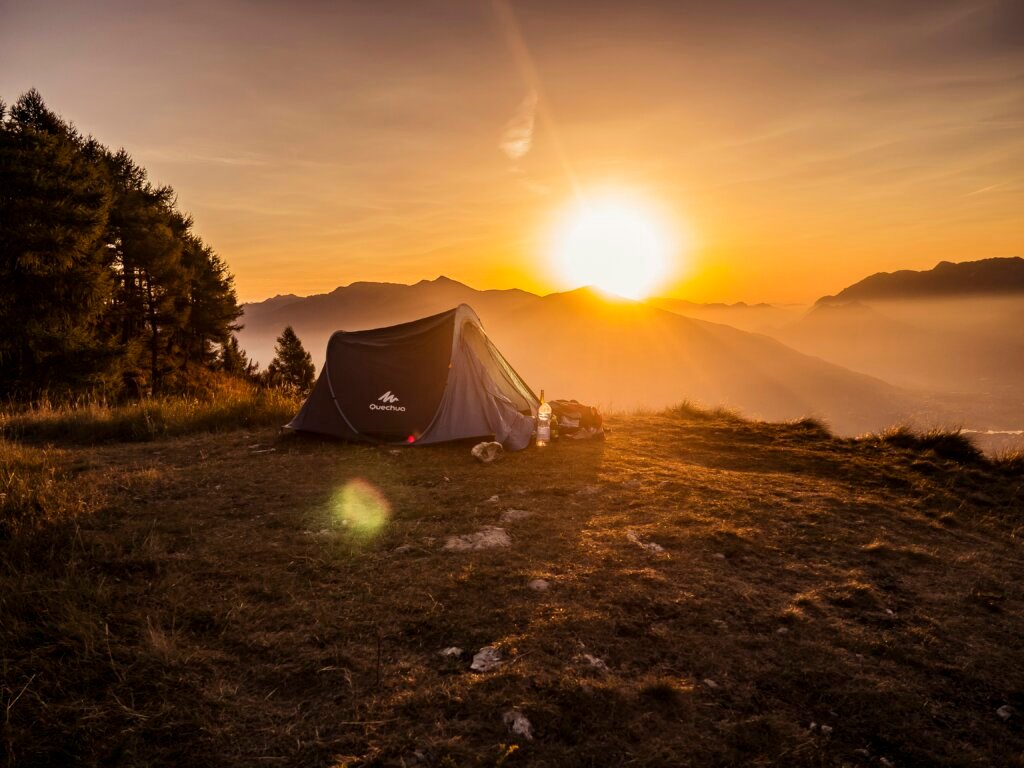
Fire Safety
Avoid open flames inside the RV
Open flames inside an RV pose a significant fire hazard. Avoid using candles or open flame stoves inside your RV, as they can easily start a fire. Instead, opt for battery-operated or electric alternatives, such as LED candles or induction cooktops. These options provide a safer alternative while still offering the ambiance and functionality you desire. By eliminating open flames inside your RV, you greatly reduce the risk of accidental fires.
Keep a fire extinguisher
Having a fire extinguisher readily available in your RV is crucial for immediate response to potential fires. Make sure your fire extinguisher is the appropriate type and size for your RV and that it’s in good working condition. Familiarize yourself with how to use the fire extinguisher properly and ensure that all occupants are aware of its location. Regularly check the pressure gauge to ensure that the fire extinguisher is still functional. By having a fire extinguisher on hand, you can take prompt action in case of a fire emergency.
Follow campground fire regulations
When camping in campgrounds or RV parks, it’s important to follow the fire regulations set by the management. Some campgrounds have designated fire pits or grilling areas, while others prohibit open fires altogether. Familiarize yourself with the specific rules and regulations of your chosen campground and ensure that you comply with them. By following these regulations, you not only prevent potential accidents but also contribute to a safe and harmonious camping environment for everyone.
Keep a safe distance from campfires
If you’re camping in an area where campfires are permitted, it’s crucial to maintain a safe distance from the fire. Sparks or flying embers can cause injuries or ignite nearby objects, such as your RV or surrounding trees. Be aware of wind direction and position your RV upwind of the campfire to minimize the risk of smoke or embers entering your RV. Set up a safe, designated seating area away from the fire to ensure everyone’s safety. By keeping a safe distance, you can enjoy the warmth and ambiance of the campfire without compromising safety.
Properly extinguish campfires
When you’re ready to extinguish your campfire, it’s vital to do so properly to prevent accidental fires. Use water or sand to fully douse the flames and stir the ashes to ensure complete extinguishment. Repeat this process until you no longer see smoke or embers. Once the fire is completely out, carefully dispose of the ashes in a designated fire pit or container provided by the campground. By properly extinguishing campfires, you prevent the risk of uncontrolled fires and contribute to a safer camping environment for everyone.
Electrical Safety
Use surge protectors
Using surge protectors is essential for safeguarding your RV’s electrical system from power surges or electrical fluctuations. Connect your RV to a reliable surge protector before plugging in any electrical devices or appliances. Surge protectors help regulate voltage and protect sensitive electronics within your RV from potential damage. Investing in a good quality surge protector will provide added safety and peace of mind during your camping trip.
Don’t overload electrical outlets
It’s important to be mindful of the electrical load you’re placing on your RV’s outlets. Overloading an electrical outlet can lead to overheating, short circuits, or even electrical fires. Be aware of the electrical capacity of your RV’s outlets and distribute the load as needed. Consider using extension cords with built-in surge protectors or find alternative methods to power multiple appliances simultaneously. By avoiding overloading electrical outlets, you can prevent potential electrical hazards and ensure a safe camping experience.
Regularly inspect cords and plugs
Inspecting the condition of your RV’s electrical cords and plugs is crucial for safety. Regularly check for any signs of fraying, cracking, or exposed wires. Damaged cords or plugs should be repaired or replaced immediately to prevent electrical shocks or fires. Additionally, ensure that all cords and plugs are rated for outdoor or RV use, as this indicates they are designed to withstand the unique demands of these environments. By regularly inspecting your RV’s electrical cords and plugs, you can minimize the risk of electrical accidents or malfunctions.
Turn off appliances when not in use
When you’re not actively using an electrical appliance in your RV, it’s important to turn it off and unplug it from the outlet. Leaving appliances plugged in and powered on when not in use can be a potential fire hazard. Additionally, turning off appliances helps conserve energy and prevents unnecessary strain on your RV’s electrical system. By adopting this simple habit, you reduce the risk of electrical accidents and promote energy efficiency during your camping trip.
Be mindful of power source compatibility
When connecting your RV to an external power source, ensure compatibility between your RV’s electrical system and the power source. Different RVs may have different power requirements, so it’s important to double-check before plugging in. Using incompatible power sources can lead to electrical malfunctions or damage to your RV’s electrical system. It’s also advisable to use a surge protector between your RV and the power source for added protection. By being mindful of power source compatibility, you can prevent potential electrical issues and ensure a safe camping experience.
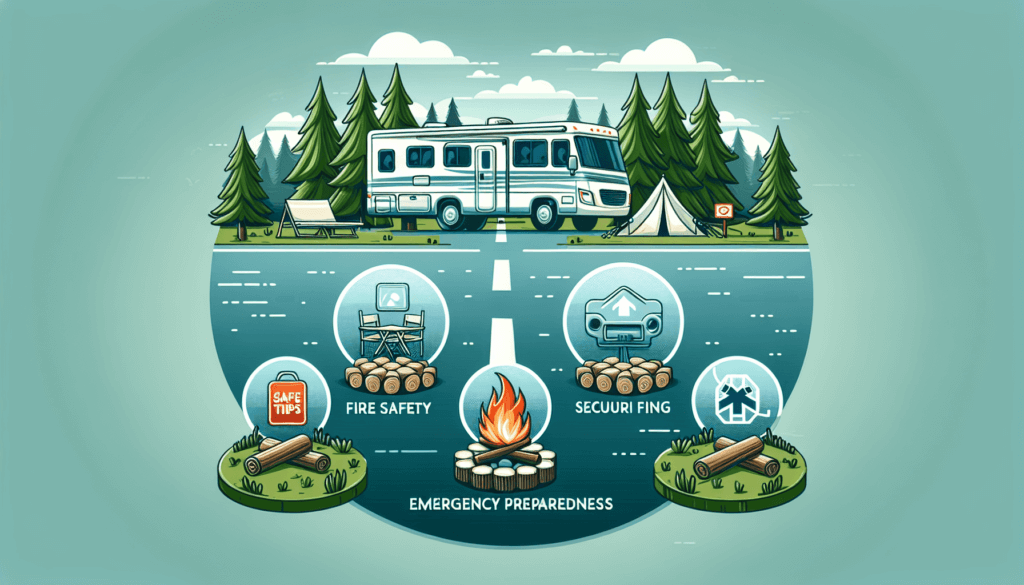
Water Safety
Test campground water before drinking
While many campgrounds provide access to freshwater, it’s essential to test the water quality before consuming it. Use a water testing kit or consult with the campground management to ensure the water is safe for drinking. If the water is found to be contaminated or unsafe, use bottled water for drinking and cooking purposes. Taking this simple precaution can prevent waterborne illnesses and ensure your well-being during your camping trip.
Use a water filter or purifier
Even if the campground water is deemed safe, using a water filter or purifier can provide an additional layer of protection. Water filters are designed to remove impurities and improve taste, while water purifiers can eliminate bacteria, viruses, and other microorganisms. Investing in a reliable water filter or purifier ensures that you have access to clean and safe drinking water throughout your camping trip. Regularly clean and maintain your water filtration system for optimal performance and safety.
Avoid wasting water
Conserving water while RV camping not only helps extend your freshwater supply but also minimizes environmental impact. Be mindful of your water usage, and avoid unnecessary wasting. Take shorter showers, turn off the faucet when not in use, and use water-efficient appliances whenever possible. Additionally, collect and reuse water for purposes such as cleaning or watering plants. By practicing water conservation, you contribute to a sustainable camping experience and ensure the availability of clean water for future campers.
Don’t leave taps unattended
Leaving taps unattended can lead to unintentional flooding and significant water waste. Always ensure that taps are turned off completely after use, both inside and outside your RV. Double-check for any leaks or drips, and address them promptly to prevent wasting water and potential damage to your RV. By being diligent in turning off taps, you conserve water, reduce the risk of accidents, and maintain a comfortable and safe camping environment.
Be cautious of water-related activities
While enjoying water-related activities is a highlight of RV camping, it’s essential to exercise caution and follow safety guidelines. Whether swimming in a lake or river, boating, or participating in water sports, always prioritize safety. Wear appropriate life jackets or personal flotation devices, follow designated swimming areas, and be mindful of currents or hazardous underwater conditions. Supervise children around water at all times, and never swim alone. By being cautious and adhering to water safety guidelines, you can prevent accidents and ensure an enjoyable aquatic experience.
Security Measures
Lock all doors and windows
Maintaining proper security measures is crucial to protect your RV and belongings from theft or unauthorized entry. Always lock all doors and windows whenever you leave your RV, even if it’s just for a short period. Use deadbolts or latch locks for added security. Establish a routine of checking that all entry points are secured before leaving your RV unattended. By implementing these simple measures, you deter potential thieves and safeguard your valuables.
Install additional security devices
Consider installing additional security devices to enhance the safety and protection of your RV. Options include motion sensor lights, security cameras, or surveillance systems specifically designed for RVs. These devices not only serve as a deterrent but also provide valuable evidence in case of a theft or vandalism. Research and choose security devices that fit your needs and budget, and consult with professionals if necessary. By investing in additional security measures, you add an extra layer of protection to your RV and ensure peace of mind during your camping trip.
Keep valuables out of sight
To minimize the risk of theft, it’s important to keep your valuables out of sight whenever possible. Close blinds or curtains to prevent passersby from seeing inside your RV. Hide valuable items such as laptops, cameras, or jewelry in inconspicuous locations or locked storage compartments. By keeping your valuables hidden, you lessen the temptation for potential thieves and reduce the risk of break-ins or theft.
Be aware of your surroundings
Being aware of your surroundings is an important aspect of personal safety and security. Familiarize yourself with the layout of the campground or RV park and be mindful of high-traffic or secluded areas. Pay attention to any suspicious activities or individuals and report them to the campground management or security staff. When exploring the surrounding area, be cautious of any potential hazards or dangerous locations. By being attentive and aware, you can prevent potential security risks and enjoy a worry-free camping experience.
Use campground security services
Many campgrounds and RV parks offer security services or have staff patrolling the area. Take advantage of these services and resources to enhance your security during your camping trip. Make note of the campground’s emergency contact number and any available security personnel. If you have any concerns or believe your safety is at risk, don’t hesitate to reach out for assistance. By utilizing campground security services, you can have peace of mind knowing that help is readily available if needed.
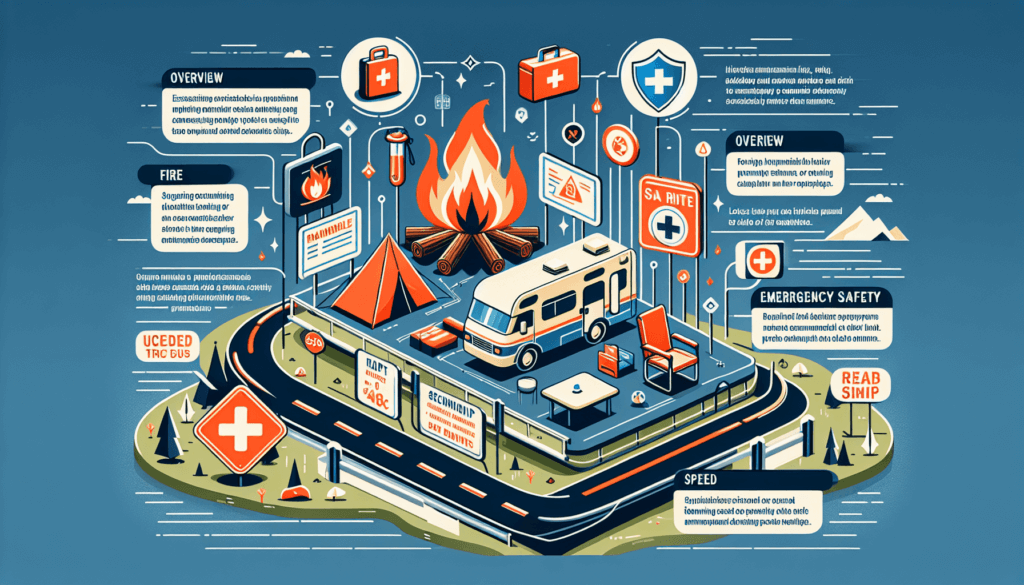
Emergency Preparedness
Have emergency contact numbers
Having emergency contact numbers readily available is essential for quick access to assistance. Keep a list of important contact numbers, including local emergency services, campground management, and roadside assistance. Store these numbers in your phone and have a printed copy in your RV. In case of an emergency, being able to quickly and easily reach the appropriate authorities or support services can make a significant difference in the outcome of the situation.
Pack a well-stocked emergency kit
An emergency kit is a crucial component of any RV camping trip. Pack a kit that includes essentials such as a first aid kit, flashlight, spare batteries, non-perishable food, water, blankets, a multi-tool, and a portable phone charger. Additionally, consider including items specific to your needs or any particular medical conditions. Regularly check and replace expired items in your emergency kit to ensure that everything is in good working condition. By having a well-stocked emergency kit, you’ll be better prepared to handle unexpected situations during your camping trip.
Know the location of the nearest hospital
Familiarizing yourself with the location of the nearest hospital or medical facility is essential for emergency preparedness. Take note of the contact information and directions to the closest hospital or urgent care center. In case of a medical emergency, having this information readily available can save time and potentially save lives. Make sure all occupants of your RV are aware of the hospital’s location and how to get there. Being prepared and informed is crucial for handling medical emergencies while on the road.
Familiarize yourself with local emergency services
When traveling to a new area, it’s important to familiarize yourself with the local emergency services available. Research the contact information for local police, fire, and ambulance services. Take note of any specific protocols or procedures that may be unique to the area you’re visiting. This information will be invaluable in case of an emergency, enabling you to quickly and effectively communicate with the appropriate authorities. By being familiar with local emergency services, you can respond efficiently and help ensure a positive outcome in emergency situations.
Personal Safety
Be cautious of strangers
While RV camping can be a social and enjoyable experience, it’s important to exercise caution when interacting with strangers. Trust your instincts and be wary of individuals who make you feel uncomfortable or raise red flags. Avoid sharing personal or sensitive information with strangers, and be mindful of who you invite into your RV. If you feel unsafe or threatened, remove yourself from the situation and seek assistance from campground personnel or local authorities. By prioritizing personal safety, you can enjoy the social aspects of RV camping while minimizing risks.
Avoid traveling alone at night
If possible, avoid traveling alone at night to enhance personal safety. Nighttime driving can be more challenging due to reduced visibility and potential fatigue. Plan your travel accordingly to ensure that you reach your destination before nightfall. If traveling alone is unavoidable, choose well-lit and populated areas for rest stops and overnight stays. By making safety-conscious travel decisions, you reduce the risk of encountering potential dangers while on the road.
Notify someone of your itinerary
Before embarking on your RV camping trip, make sure to notify a trusted friend or family member of your itinerary. Share details such as your planned route, destination, and estimated time of arrival. Provide them with emergency contact numbers and keep them updated on any changes to your plans. Regularly check in with your designated contact person to let them know you are safe and inform them of any deviations from your original itinerary. By keeping someone informed of your whereabouts, you have an additional layer of safety and accountability during your camping trip.
Protect yourself from sun exposure
Sun exposure can be a significant risk during outdoor activities, especially in sunny or hot climates. Protect yourself from harmful UV rays by wearing sunscreen with a high SPF, a wide-brimmed hat, and sunglasses. Seek shade during the hottest parts of the day and stay hydrated to prevent heat-related illnesses. Incorporate sun protection into your daily routine, even if the weather seems mild. By taking proactive measures, you reduce the risk of sunburns, heatstroke, and other sun-related complications.
Dress appropriately for weather conditions
The weather can change quickly during RV camping trips, so it’s important to dress appropriately for all conditions. Pack a variety of clothing options, including layers that can be easily added or removed. Check the weather forecast for your destination and plan your outfits accordingly. Dressing for the weather not only ensures comfort but also helps prevent potential health issues such as hypothermia or heat exhaustion. By being prepared and dressing appropriately, you can stay comfortable and safe throughout your camping trip.
RV Camping Safety Tips: What You Need to Know Before Hitting the Road
RV camping is a fantastic way to enjoy the great outdoors, explore new destinations, and create lasting memories with friends and family. However, it’s important to prioritize safety and be prepared before hitting the road in your RV. By following these comprehensive RV camping safety tips, you can ensure a safe and enjoyable camping experience.
Planning and Preparation
Before embarking on your RV camping adventure, take the time to plan and prepare adequately. Check the weather forecast for your destination, as weather conditions can greatly impact your trip and safety. Plan your route in advance, considering factors such as road conditions, construction zones, and potential traffic congestion. Create a checklist to ensure you have all the essential items you need for your trip. Research campgrounds and RV parks, paying attention to reviews, amenities, and safety measures.
RV Safety Inspection
Prioritize RV safety by conducting a thorough inspection before hitting the road. Check the tires for signs of wear and tear and ensure they are properly inflated. Inspect the brakes, lights, signals, propane system, and electrical system to ensure everything is in good working condition. Test smoke and carbon monoxide detectors to verify they are functional. By regularly inspecting and maintaining your RV, you can prevent accidents and ensure a safe journey.
Driving Safety
Driving an RV requires skill and attentiveness. Practice driving and parking your RV in a safe area to familiarize yourself with its size and handling. Observe speed limits and avoid distractions while driving to ensure your full attention is on the road. Use mirrors effectively, maintain a safe following distance, and be aware of the height and weight of your RV. Prepare for emergencies by having emergency contact numbers, a well-stocked emergency kit, and familiarity with local emergency services.
Campsite Safety
Choose a level campsite to ensure stability and comfort for your RV. Use wheel chocks to prevent accidental movement while parked. Check for overhanging branches that could potentially damage your RV. Secure all belongings inside and outside your RV to deter theft. Keep a first aid kit readily available for minor injuries or emergencies. Avoid overcrowding the living space inside your RV and be cautious of pests and wildlife in the surrounding area. By prioritizing campsite safety, you can enjoy a secure and relaxing camping experience.
Fire Safety
Open flames inside an RV pose a significant fire hazard. Avoid using candles or open flame stoves inside your RV and opt for safer alternatives. Keep a fire extinguisher readily available and ensure that all occupants are aware of its location. Follow campground fire regulations and maintain a safe distance from campfires. Properly extinguish campfires to prevent uncontrolled fires. By practicing fire safety, you mitigate fire risks and create a safe environment for everyone.
Electrical Safety
Safeguard your RV’s electrical system by using surge protectors and avoiding overloading electrical outlets. Regularly inspect cords and plugs for any signs of damage and turn off appliances when not in use. Be mindful of power source compatibility and prevent potential electrical issues. By following these electrical safety tips, you can minimize the risk of electrical accidents and ensure a safe camping experience.
Water Safety
Test campground water before drinking and use a water filter or purifier for added protection. Conserve water and avoid wasting it whenever possible. Don’t leave taps unattended and be cautious of water-related activities. By prioritizing water safety, you can prevent waterborne illnesses and ensure a safe and hygienic camping trip.
Security Measures
Maintain proper security measures to protect your RV and belongings. Lock all doors and windows whenever you leave your RV and consider installing additional security devices such as motion sensor lights or security cameras. Keep valuable items out of sight and be aware of your surroundings. Utilize campground security services for added peace of mind. By implementing security measures, you deter potential thefts and create a secure camping environment.
Emergency Preparedness
Be prepared for emergencies by having emergency contact numbers readily available and packing a well-stocked emergency kit. Know the location of the nearest hospital and familiarize yourself with local emergency services. By being prepared, you can effectively respond to emergencies and ensure the safety and well-being of yourself and your fellow travelers.
Personal Safety
Prioritize personal safety by being cautious of strangers and avoiding traveling alone at night whenever possible. Notify someone of your itinerary and protect yourself from sun exposure. Dress appropriately for weather conditions and be prepared for changing weather throughout your trip. By respecting personal safety guidelines, you can enjoy a safe and worry-free RV camping adventure.
In conclusion, RV camping can offer incredible experiences and unforgettable adventures. By prioritizing safety and following these comprehensive RV camping safety tips, you can ensure a safe and enjoyable journey. From planning and preparation to personal safety and emergency preparedness, every aspect of RV camping safety is essential. So, before hitting the road, take the time to be prepared, stay vigilant, and make safety your top priority. Happy RV camping!

